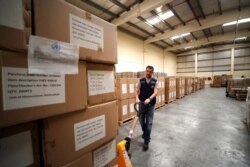The U.S. House of Representatives passed $11 billion in foreign aid Wednesday as part of the massive $1.9 trillion American Rescue Plan. The move is just the beginning of the U.S. international response to the coronavirus pandemic, former aid officials told lawmakers.
“The gap still remains,” Rajiv Shah, a former administrator of the U.S. Agency for International Development and currently president of the Rockefeller Foundation, said during a House panel hearing Wednesday.
“In order for the U.S. to lead the world in filling that gap,” he added, “we will likely both have to do more to bring together multilateral partners through the World Bank, the International Monetary Fund and other institutions where we can use our voice.”
Experts had pushed for the American Rescue Plan to contain as much as $20 billion in foreign aid.
“This was a tricky issue, getting that $11 billion in there, but it’s an acknowledgement of a few things,” said J. Stephen Morrison, senior vice president at the Center for Strategic and International Studies and director of its Global Health Policy Center.
“It’s an acknowledgement that fixing COVID within the United States’ boundaries and getting out from underneath the pandemic — reopening society, reopening the economy — will only be successful if it is done universally around the world, that we cannot be thinking as if it were some isolated islands,” he said.
Some aid recipients
Morrison said the $11 billion includes support for the Global Fund to Fight AIDS, Tuberculosis and Malaria, which has taken on the fight against the coronavirus in many low-income countries. Money also will go to the Centers for Disease Control and Prevention’s health preparedness programming.
The United States has provided $2 billion out of a planned $4 billion to COVAX, a global alliance providing COVID-19 vaccines to at-risk populations in 92 mid- and low-income countries, according to a USAID press release. The COVAX program runs separately from Russian and Chinese efforts to win the vaccine diplomacy race by distributing their own shots.
Republican Representative Nicole Malliotakis said it was crucial to counter Chinese influence in the coronavirus aid sphere by ensuring the aid in the American Rescue Plan and other U.S. development programs is “clearly branded as a gift from the American people, United States, as the most generous nation in the world.”
The American Rescue Plan is the fifth coronavirus relief package passed by Congress in the past year to address the economic and health impact of the virus that causes the COVID-19 disease. It is not clear if U.S. lawmakers will pass another aid package given concerns about the massive amount of spending to date.
Shah, however, said it was clear that the United States and other wealthy nations would need to work together to address the crisis in the developing world.
“There will be the need for much greater assistance in a coordinated global economic recovery,” he said at Wednesday's hearing. “It is true that developing countries and emerging economies have been hit hard by the pandemic. And it is also true that while we have done 20% to 30% of GDP [gross domestic product] and fiscal and monetary responses across wealthier nations, emerging markets have done 6% and developing countries have done less than 2%.”
Subcommittee Chairman Joaquin Castro, a Democrat, warned that global poverty rates have risen for the first time in decades during the pandemic.
The bulk of the American Rescue Plan funds a massive anti-poverty program within the United States. Experts estimate that the relief bill’s impact on the American economy will cause the global economy to grow by as much as 1 percent.
President Joe Biden is expected to sign that bill into law by the end of this week.








